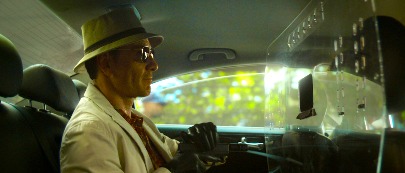 The story of a paid assassin’s quest to get even with a client who tried to have him killed is a bracing satire on the modern culture of violence.
The story of a paid assassin’s quest to get even with a client who tried to have him killed is a bracing satire on the modern culture of violence.
The hit man. The professional assassin. How many such people actually exist? I’m going to say they’re a microscopic percentage of the population. Yet in popular fiction and film, this character has been reborn and remade countless times: first, naturally, in the crime genre, then the action film, and there have also been a few comedy versions, hybrids, take-offs and such. It’s now an established sub-genre in the movies. And why is this? Well, instead of boring us with sociology, director David Fincher, with screenwriter Andrew Kevin Walker, have adapted a French graphic novel into a film called The Killer, that playfully explores the question.
Michael Fassbender plays a hit man—we never learn his name—who is preparing days ahead of time to kill a man in Paris. He’s in a tall apartment building with a room directly across the hotel room where his target will be staying. While he waits he practices yoga, listens to music (throughout the film the only music he listens to is by the rock band The Smiths), and in soft voice-over talks about his profession and the rules he observes in order to be good at what he does.
Now, I haven’t read the books, and I don’t know if the authors were playing it straight. But five minutes into the film, when the killer’s voice over thoughtfully refers to Popeye the Sailor and his statement “I am what I am,” I knew that Fincher and Walker weren’t completely serious. The killer’s earnest monologues are pretentious, sometimes startlingly silly. He also goes to great lengths to pose (to himself, we presume) as one of the best, that is the coldest and most methodical of assassins, repeating certain rules throughout the movie. “Stick to your plan,” he says. “Anticipate, don’t improvise. Trust no one. Never yield an advantage. Fight only the battle you’re paid to fight.”
After this lengthy and intense build up, it’s finally time to do the job, but when he fires the shot, he misses. He then flees to his luxurious compound in the Dominican Republic, but finds his girlfriend in the hospital, savagely beaten by two people trying to get to him. The rest of the movie is about him tracking down everyone involved, and eventually the client who paid for all of this. There’s the usual violent fight to the death between the killer and one of the adversaries. This is a slick and suspenseful action film. It’s not like it’s a spoof, with jokes. But the contrast between the mechanics of the plot, and the voice-over narration and dialogue, creates a darkly satiric effect.
The ending confirmed my hunch about The Killer. Of course I won’t tell you the ending. But the metaphors here are not that hard to see. Why are hit men films made? Because they make money, and filmmaking is a business. What else is a business? Being a hit man. There’s something in the hard and implacable character of an assassin, like Jason Bourne in the Bourne series, along with a kind of invincibility endowed by his skills, that appeal to our wish fulfillment and gives us pleasure.
There is yet more depth to the satiric idea of The Killer, including the fascination with killing itself. We get to smile at the selfish presumption by which we entertain ourselves with these things. The killer is not a hero—he’s just another faceless worker.

Christopher Nolan dramatizes the spectacular escape of British troops from Dunkirk in 1940, in a film that emphasizes the brutality and terror of war....

One of the most unusual examples of propaganda ever filmed, made in the midst of the Second World War, imagines what it would be...

Claire Denis, the French filmmaker, has established her international reputation over three decades as a director of art cinema: social dramas with a vast...